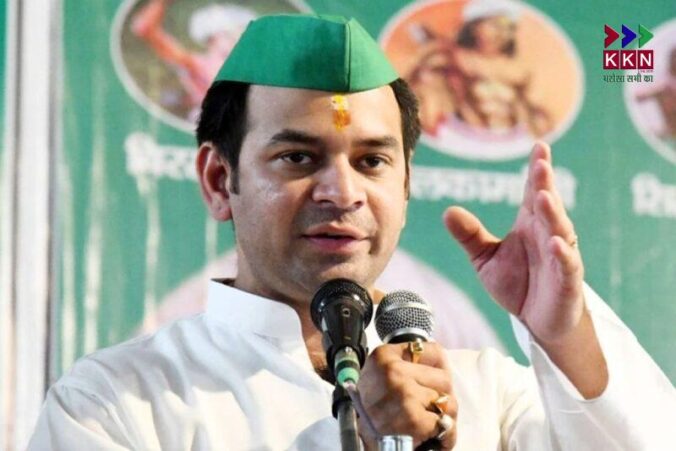
The political landscape in Mahua has become more vibrant as voters, particularly from youth, women, and local businesses, show strong support for candidates focused on development. Tej Pratap Yadav, despite being expelled from both the RJD and his family, remains a prominent figure in the Mahua Assembly election. As the election date approaches, Tej Pratap’s past contributions to local development continue to resonate with voters across the constituency.
Tej Pratap Yadav’s Stronghold in Mahua
Tej Pratap Yadav, the estranged son of Lalu Prasad Yadav, is still a strong contender in the Mahua Assembly constituency, despite the challenges he faces. His efforts during his tenure as the Health Minister, particularly in establishing a medical college, have left a lasting impact on the region. Many residents of Mahua, particularly in the surrounding villages, continue to rally behind him, recognizing his significant contributions to local infrastructure and employment.
A local resident, Satyanarayan Rai from Kadilpur, expressed his support, saying, “Tej Pratap may have been expelled, but he is still Lalu Prasad Yadav’s son, and we will vote for him. He built a medical college here, so now we don’t have to travel to Patna or Delhi for treatment, and many local people have jobs because of it.” This sentiment reflects the deep-seated loyalty that many people have for Tej Pratap, despite his expulsion from the RJD.
Voter Sentiment Driven by Development Initiatives
Tej Pratap Yadav first contested the Mahua seat in 2015 and vacated it in 2020. During his tenure, he laid the groundwork for a medical college that many locals believe transformed the area. This initiative has boosted local businesses, provided employment, and made healthcare more accessible. For instance, Guddu Chauhan, a tea seller who moved from Mumbai to Mahua, stated, “Everything has happened because of Tej Pratap, so I will vote for him without a second thought.”
However, not all voters are entirely loyal to one candidate. Some remain torn between their loyalty to party leadership and their support for local development. Umesh Rai of Sadapur expressed this internal conflict, saying, “On one side is Lalu’s son, and on the other is Lalu’s candidate. We want Tejashwi to be CM, so we may vote for Mukesh Roshan. If he lags behind, we will support Tej Pratap.”
Local development issues such as education, employment, and infrastructure remain at the forefront of voter concerns. Many voters, like Amardeep, a youth returning from his PhD studies in Assam, are particularly concerned with education. Amardeep remarked, “Because of the medical college, many people started businesses here. Education is a key issue. We want local institutions so we don’t have to go far for studies.”
Pramod, a handicapped auto driver, added, “Nitish Kumar has done good work for Bihar, but Tej Pratap has done the most for Mahua. The medical college means we can now get treatment locally.”
Women Voters Acknowledge Improvements Under Nitish Kumar
While Tej Pratap’s contributions to local development have earned him the support of many voters, women in the constituency also acknowledge the progress made by Nitish Kumar’s government. Meena Sharma, an NGO worker, noted that safety for women has improved significantly, with the availability of loans through the Jeevika program allowing women to work outside their homes. Pooja, a local woman, stated, “Ten years ago, girls feared leaving home. Now I can go out even at night, thanks to government initiatives.” Despite these positive changes, women in Mahua are inclined to vote based on the local development brought about by Tej Pratap, highlighting the direct impact his actions have had on their daily lives.
Tej Pratap’s Legacy and Lalu’s Influence in Mahua
Political experts suggest that Tej Pratap’s strong position in Mahua can be attributed to the lasting influence of his father, Lalu Prasad Yadav, among the local electorate. Journalist Vicky Kumar stated, “Tej Pratap won here in 2015 and laid the foundation for the medical college. He is leveraging that work this election, and Lalu’s supporters see him as a rightful candidate despite his expulsion from RJD.”
Priyadarshi Ranjan, a political analyst, mentioned, “The real contest in Mahua is between RJD’s Mukesh Roshan and Tej Pratap. Tej Pratap’s image as a hardworking leader helps him capitalize on local development achievements.”
Senior journalist Praveen Bagi also believes that Tej Pratap’s claim to development work resonates with voters. He stated, “Even though he has been expelled from the party, Tej Pratap’s legacy and the work he has done for Mahua could ensure his victory, especially if Lalu or Rabri Yadav show their support.”
Other Candidates and Their Strategies
The political dynamics in Mahua are also shaped by the presence of other candidates. Sanjay Kumar Singh of LJP (R), who finished third in the 2020 elections, focuses on the debate of local versus outsider candidates. He argued, “Development hasn’t happened because outsiders win elections. Local candidates should be the ones to bring change.”
Independent candidate Asma Parveen, who was previously with JDU, is also contesting after being denied a party ticket. Parveen emphasized her connection to Mahua, saying, “I entered politics to serve Mahua. I didn’t get the ticket, so I am contesting independently with public support.”
With multiple candidates dividing the Yadav, Muslim, and EBC votes, political analysts predict a closely contested election. While Tej Pratap enjoys strong name recognition and is credited with local development initiatives, the split among traditional RJD supporters could play a pivotal role in determining the outcome.
As the Mahua Assembly election approaches, the support for development-centric candidates remains strong. Tej Pratap Yadav continues to leverage his legacy of local development, particularly his contributions to healthcare and employment. While party loyalties remain important to some voters, many are prioritizing candidates who can deliver tangible improvements to their lives. As the election date nears, the competition between Tej Pratap, Mukesh Roshan, and other candidates will intensify, with local development playing a crucial role in shaping voter decisions. The Mahua constituency’s outcome will reflect the significance of local issues in the larger political landscape.


